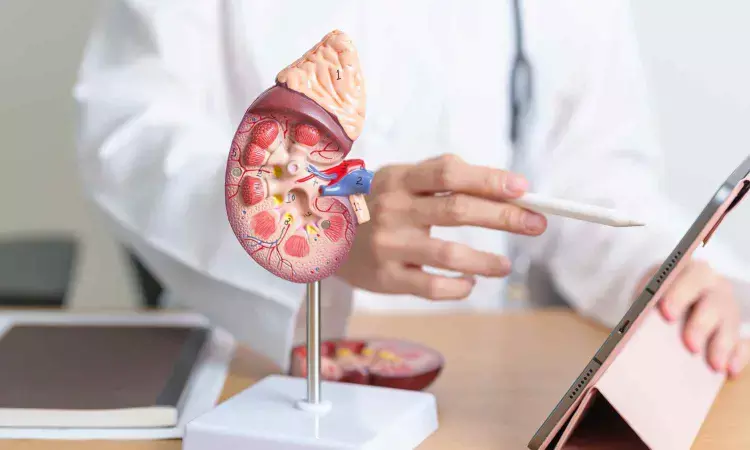- Home
- Medical news & Guidelines
- Anesthesiology
- Cardiology and CTVS
- Critical Care
- Dentistry
- Dermatology
- Diabetes and Endocrinology
- ENT
- Gastroenterology
- Medicine
- Nephrology
- Neurology
- Obstretics-Gynaecology
- Oncology
- Ophthalmology
- Orthopaedics
- Pediatrics-Neonatology
- Psychiatry
- Pulmonology
- Radiology
- Surgery
- Urology
- Laboratory Medicine
- Diet
- Nursing
- Paramedical
- Physiotherapy
- Health news
- Fact Check
- Bone Health Fact Check
- Brain Health Fact Check
- Cancer Related Fact Check
- Child Care Fact Check
- Dental and oral health fact check
- Diabetes and metabolic health fact check
- Diet and Nutrition Fact Check
- Eye and ENT Care Fact Check
- Fitness fact check
- Gut health fact check
- Heart health fact check
- Kidney health fact check
- Medical education fact check
- Men's health fact check
- Respiratory fact check
- Skin and hair care fact check
- Vaccine and Immunization fact check
- Women's health fact check
- AYUSH
- State News
- Andaman and Nicobar Islands
- Andhra Pradesh
- Arunachal Pradesh
- Assam
- Bihar
- Chandigarh
- Chattisgarh
- Dadra and Nagar Haveli
- Daman and Diu
- Delhi
- Goa
- Gujarat
- Haryana
- Himachal Pradesh
- Jammu & Kashmir
- Jharkhand
- Karnataka
- Kerala
- Ladakh
- Lakshadweep
- Madhya Pradesh
- Maharashtra
- Manipur
- Meghalaya
- Mizoram
- Nagaland
- Odisha
- Puducherry
- Punjab
- Rajasthan
- Sikkim
- Tamil Nadu
- Telangana
- Tripura
- Uttar Pradesh
- Uttrakhand
- West Bengal
- Medical Education
- Industry
Two-Thirds of Indian Children With Lupus Develop Nephritis Early, Registry Finds

India: A recent study from India has revealed that kidney involvement is highly prevalent among children diagnosed with systemic lupus erythematosus (SLE), with nearly two-thirds developing lupus nephritis (LN) either at diagnosis or within five years. These findings are part of the first report from the Indian Pediatric Lupus Nephritis (pLN) Registry and were published in Clinical Rheumatology by Dr. Sanjukta Poddar and colleagues from the Institute of Child Health, Kolkata.
The Indian pLN Registry, which began in 2020, is the first prospective initiative of its kind in a low- and middle-income country (LMIC). It collects data from multiple centers across India to better understand the clinical characteristics, laboratory parameters, and renal biopsy findings in children (≤18 years) diagnosed with lupus and nephritis. The present report captures the initial clinical presentation of these children and highlights some stark patterns.
The following were the key findings of the study:
- Of the 154 children enrolled in the registry by July 2024, 75% were female. The median age at diagnosis was 12 years.
- Most children had kidney involvement at the time of lupus diagnosis, while others developed nephritis within five years.
- Edema was present in 75% of the children.
- Hypertension was in 54% of cases.
- Proteinuria was detected in 98% of children, with nearly 70% exhibiting nephrotic-range protein loss.
- Acute kidney injury (AKI) occurred in 43% of patients, with 20% having stage 3 AKI.
- Low complement levels (C3, C4, or both) were in 94% of the cohort.
- Anti-nuclear antibody positivity was seen in 96% of children.
- Class IV lupus nephritis was the most common renal biopsy finding, affecting 45% of patients.
- Class IV lupus nephritis was associated with significantly lower kidney function compared to Class V, indicating a more severe disease course.
The researchers noted that AKI, often overlooked in earlier studies due to retrospective data limitations, was found to be far more common when assessed prospectively. Given its independent link with increased morbidity and mortality, early identification and management of AKI in pediatric lupus is critical.
The report highlights the urgent need for better awareness, early diagnosis, and robust follow-up in managing pediatric lupus nephritis, particularly in resource-constrained settings. As children enrolled in the registry continue to be followed up, researchers hope to gain deeper insights into treatment responses and long-term outcomes, which could ultimately help refine care protocols and improve prognosis for affected children in LMICs.
The authors concluded, "The study emphasizes the value of prospective data collection in understanding disease burden more accurately and shaping more effective, evidence-based strategies for managing pediatric lupus nephritis."
Reference:
Poddar, S., Dasgupta, D., Pradhan, S. et al. Clinical presentation of children with lupus nephritis from a low- and middle-income country (LMIC): an initial report from the Indian pSLE Nephritis Registry. Clin Rheumatol (2025). https://doi.org/10.1007/s10067-025-07576-9
Dr Kamal Kant Kohli-MBBS, DTCD- a chest specialist with more than 30 years of practice and a flair for writing clinical articles, Dr Kamal Kant Kohli joined Medical Dialogues as a Chief Editor of Medical News. Besides writing articles, as an editor, he proofreads and verifies all the medical content published on Medical Dialogues including those coming from journals, studies,medical conferences,guidelines etc. Email: drkohli@medicaldialogues.in. Contact no. 011-43720751


